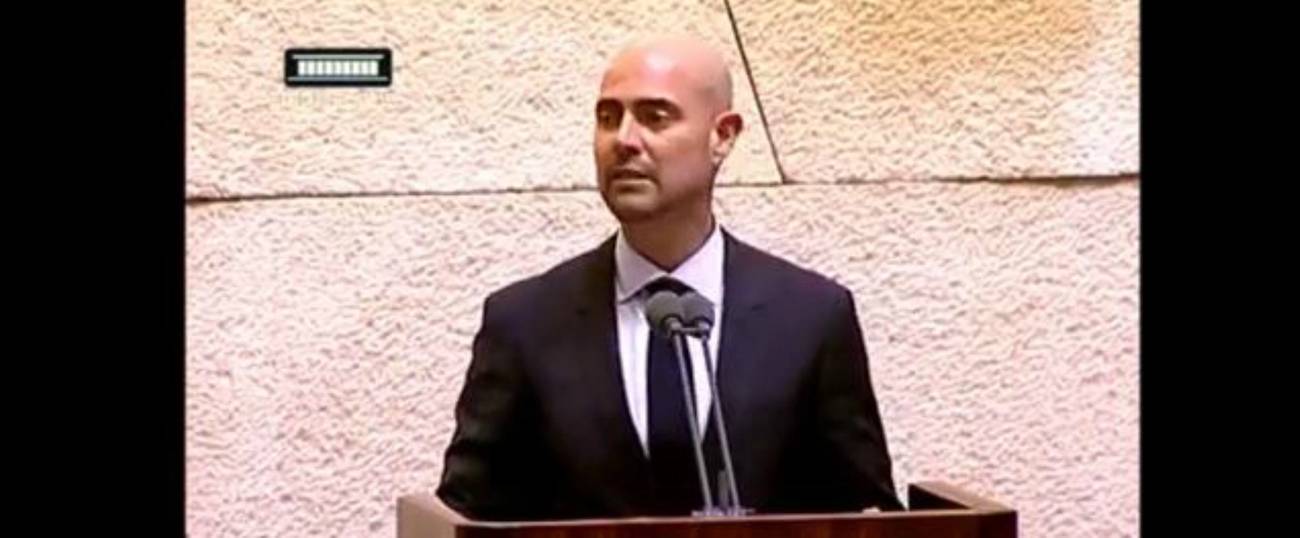Watch the Knesset Argue Over Which Party Was First to Elect a Gay Member
A scene that could only happen on the floor of Israel’s parliament




On Monday, Israeli lawyer Amir Ohana was sworn into the Knesset, replacing the recently resigned Likud politician Silvan Shalom. What made the event particularly noteworthy was that Ohana, the chair of Likud’s Pride Caucus, is the party’s first openly gay MK, a fact he emphasized in his inaugural speech to the parliament by referencing his partner and their children.
“I am here as the son of Meir and Esther Ohana, who immigrated from Morocco to build a country,” he opened. “I am here with my other half, Alon, my true love. I am here as the father of the children Ela and David. And like [the biblical] David who defeated Goliath in the Valley of Ela, I am here against all the odds. I am here with all of who I am and what I am, what I’ve chosen and what I haven’t, and am proud of it all: Jewish, Israeli, Mizrahi, gay, Likudnik, a security hawk, a liberal, and a man of the free market.”
After Ohana’s maiden address, he was congratulated by his fellow Knesset members, Arab and Jew alike, though the ultra-Orthodox were unsurprisingly absent. Following the handshakes and hugs, however, something quintessentially Israeli happened in the famously rambunctious parliament: the politicians got into an argument over which party was the first to elect a gay member in its primaries.
It began when Prime Minister Netanyahu ascended the podium to welcome Ohana to the Knesset, a rare gesture in its own right. “I think all of us were deeply impressed by the speech of our friend Amir Ohana,” he said, “and I am happy to welcome him to our ranks, to the benches of the Likud, and to the benches of the Knesset.” Then Bibi offered a brief boast. “I want to make clear a point that may not be clear,” he continued. “Amir is the first clear and visible representative of the gay community who was elected in an open primary, that is, when he was completely out. And he was elected by thousands of voters in the Likud primaries.”
At this, a Knesset member objected from the floor. “What about Nitzan Horowitz?” he asked, referring to the recently retired Meretz party MK. “That [appointment] was by the party’s central committee,” replied Netanyahu. “And Professor Uzi Even?” interjected Opposition leader Isaac Herzog of the Labor party. A noted chemist, Even had served in the Meretz party. “Let’s compare numbers,” responded Netanyahu, pointing out that Likud is the largest party in Israel, and that its primaries are open to all its members. Heated discussion ensued among the assembled Knesset members. “If so, then all the more so!” Bibi finally said. “[The first] in Likud!”
In fact, Netanyahu had it right. As The Jerusalem Post reported, “MK Itzik Shmuly (Zionist Union) is gay and was elected in a primary, but he was in the closet when he was voted in; former Meretz MKs Uzi Even and Nitzan Horowitz are gay, but their party’s primary is limited to its central committee.”
After the kerfuffle, Netanyahu closed with parting praise for Ohana: “I think he will be an excellent Knesset member and that he will be—and already is—a bridge between different parts of the public. I welcome him with appreciation, with respect, and with pride.”
Watch the entire exchange below, with English subtitles:
Yair Rosenberg is a senior writer at Tablet. Subscribe to his newsletter, listen to his music, and follow him on Twitter and Facebook.